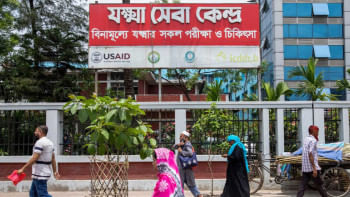Striking on population budget criticised as anti-women agenda

The decision of the USA as revealed by the State Department to stop funding to United Nations Population Fund (UNFPA) might have serious implications on the family planning programmes of 150 developing countries around the world, particularly in Bangladesh.
As we observed, UNFPA has been providing support to popularise the small family norms, dissemination of knowledge of safe delivery, training of service providers at home and abroad, supply of contraceptives and above all, supporting policy framework in behaviour change communications and management of the family planning programme as a whole. It is an erroneous accusation that UNFPA is supporting coercive abortion and involuntary sterilisation.
In Bangladesh, family planning programme itself is a voluntary programme with a cafeteria approach of contraceptives and acceptance of permanent methods depending on the informed consent. There is no scope of coercion or compulsion in such a voluntary programme like one child family norm as practiced in China earlier. All political governments since independence were in favour of family planning programme in Bangladesh and faith based societies including Imam training also supported the small norm family and safety of mother and child.
In fact this decision of cutting off budget is being criticised as anti women policy. This cut jeopardises the health and rights of millions of women and girls around the world.
The sudden budget cuts by exercising the policy of global gag might not be supported by people at large especially in this population sector where USA is the fourth largest donor to UNFPA contributing about US$ 75 Million to the core budget and other specified of programme efforts in 2015. The UNPFA will lose US$ 32.5 million in funding from the 2017 budget as the State Department said, with funds shifted to similar programmes at the US Agency for International Development.
The administration accused this agency that through its work with China's government, of supporting population control programmes in China that include coercive abortion. UNFPA itself refuted this claim of coercion, as all of its work promotes the human rights of individuals and couples to make their own decisions, free of coercion or discrimination.
This sudden strike might trigger more social instability and create a serious bottleneck in achieving the targets of goal 3 of SDG 2030, to ensure healthy lives and promote well-being for all at all ages and also to reduce the global maternal and neonatal mortality in particular as targeted. This decision might act as deterrent to achieve the goal of Universal Health Care and Health for all.
Some agencies supporting family planning programmes like International Planned Parenthood Federation and other international and national NGOs contributing much for demographic transition will be adversely affected to continue their programmes in future.
Family Planning Programme in Bangladesh has proved to be a model in achieving its successes under challenging environment. The total fertility rate has reduced 2.3 per women (BDHS 2014) that reached almost near to the replacement level of fertility, maternal mortality reduced to 176 in hundred thousand (WHO) and contraceptive prevalence rate reached to 62.4% (BDHS 2014) percent with the increase of life expectancy at birth to almost 71 years in general.
The writer is a former advisor to the caretaker government.
E-mail: [email protected]

 For all latest news, follow The Daily Star's Google News channel.
For all latest news, follow The Daily Star's Google News channel. 



Comments